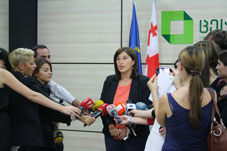OSCE/ODIHR says CEC operates in a transparent and efficient manner
By Ana Robakidze
Wednesday, October 16


“However, from the beginning, the campaign atmosphere has been marked by a tense cohabitation between the governing coalition, the Georgian Dream (GD), and the parliamentary opposition party, the UNM, and their respective leaders,” the report states.
According to the OSCE/ODIHR, the candidates and parties are focusing their efforts on door-to door activities and although, “the campaign is low key so far, the number of rallies has increased since the end of September” and Giorgi Margvelashvili of the GD, Davit Bakradze of the UNM and Nino Burjanadze, the leader of Democratic Movement-United Georgia party, have been the most active candidates.
The report also speaks briefly about the electoral program the candidates have presented and says that “candidate rallies have focused on how their respective party can best improve the lives of their fellow citizens,” including increasing salaries, decreasing unemployment, and improving health care services.
“Most candidates also call for the ‘restoration of justice’ after nine years under the previous government. Future relations with Russian Federation and territorial integrity are also issues in the campaign,” the report says.
The media freedom the report notes that, print media offers a wide range of opinions to the public and also, “it is believed that journalists are more comprehensively covering major political events. However, there is still a lack of critical analysis and analytical reports. National TV networks remain the major source of information for the electorate.”
The OSCE/ODIHR says the Central Election Commission (CEC) operates in a transparent and efficient manner, taking measures to ensure ethnic minority groups fully enjoy their political rights. “For this election, the CEC established a special working group on ethnic minority issues, organized several meetings with national minority representatives and visits to minority regions. The CEC provided grants to support civic integration and increase the participation of national minorities in the election process and carried out trainings, awareness-raising, and voter education projects in cooperation with several minority and other NGOs in minority languages and regions.
According the report, the CEC operates properly and “all election deadlines have been met and all stakeholders expressed confidence in the administration of the election.”
